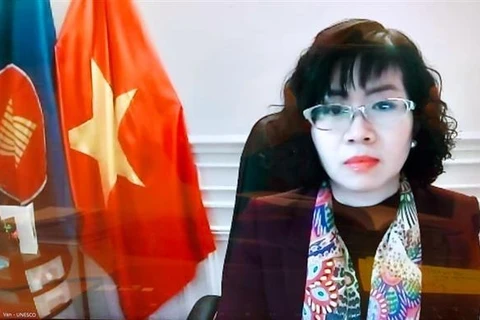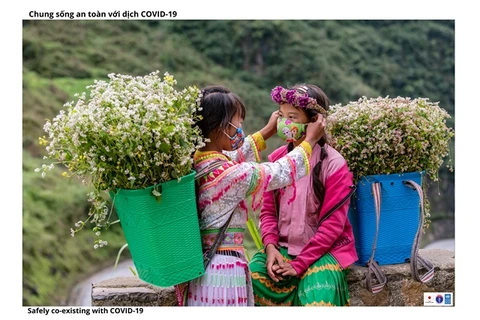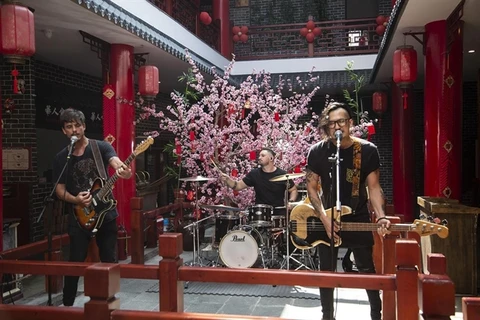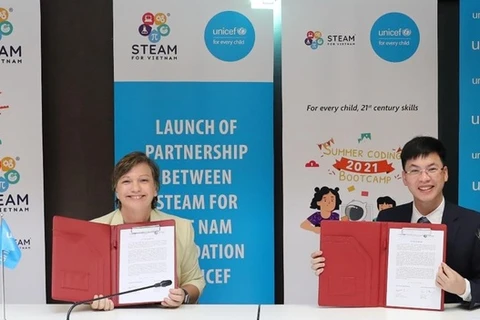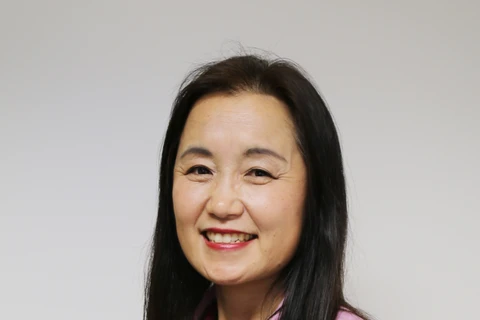Hanoi (VNA)– The United Nations Educational, Scientific and Cultural Organisation (UNESCO) in Vietnam on August 3 launched the campaign #KeepingGirlsinthePicture - "For a future picture with girls", calling on the community to share inspirational stories to encourage ethnic minority students, especially girls, to continue their studies after the pandemic ends.
According to UNESCO, the COVID-19 pandemic has closed schools and caused the largest disruption of education in history. More than 1.5 billion students are affected by the pandemic worldwide, of which more than 767 million are girls.
The organisation estimated that more than 11 million female students – from preschool to university – might not return to school last year.
This alarming number not only threatens progress on gender equality which has been achieved over the decades but also puts girls at risk of child labour, forced marriage and victims of various forms of violence.
The global campaign #KeepingGirlsinthePicture - "For a future picture with girls" aims to ensure that girls' learning is not disrupted during school closures, promoting a safe environment for them when educational institutions reopen and calls for efforts to protect the progress made in their education.
In Vietnam, the campaign is implemented within the framework of the project "We are able (Achieving a better living and education)", which is implemented by UNESCO in collaboration with the Ministry of Education and Training and the National Assembly’s Committee for Ethnic Minorities Affairs, with the support of CJ Group of the Republic of Korea. It aims to improve access to education of ethnic minority girls in Ha Giang, Ninh Thuan, and Soc Trang provinces.
UNESCO has launched the communication campaign on social networks by collecting and spreading stories from the community about the importance of education in life. The stories will be shared and posted on the fan page "UNESCO Office in Vietnam" to spread positive things to the community, towards the goal of "keeping girls in the picture".
Interested person can send their stories in Vietnamese within 500 to 800 words, along with an illustrated photo to the email address: hanoi@unesco.org until September 5, 2021./.
According to UNESCO, the COVID-19 pandemic has closed schools and caused the largest disruption of education in history. More than 1.5 billion students are affected by the pandemic worldwide, of which more than 767 million are girls.
The organisation estimated that more than 11 million female students – from preschool to university – might not return to school last year.
This alarming number not only threatens progress on gender equality which has been achieved over the decades but also puts girls at risk of child labour, forced marriage and victims of various forms of violence.
The global campaign #KeepingGirlsinthePicture - "For a future picture with girls" aims to ensure that girls' learning is not disrupted during school closures, promoting a safe environment for them when educational institutions reopen and calls for efforts to protect the progress made in their education.
In Vietnam, the campaign is implemented within the framework of the project "We are able (Achieving a better living and education)", which is implemented by UNESCO in collaboration with the Ministry of Education and Training and the National Assembly’s Committee for Ethnic Minorities Affairs, with the support of CJ Group of the Republic of Korea. It aims to improve access to education of ethnic minority girls in Ha Giang, Ninh Thuan, and Soc Trang provinces.
UNESCO has launched the communication campaign on social networks by collecting and spreading stories from the community about the importance of education in life. The stories will be shared and posted on the fan page "UNESCO Office in Vietnam" to spread positive things to the community, towards the goal of "keeping girls in the picture".
Interested person can send their stories in Vietnamese within 500 to 800 words, along with an illustrated photo to the email address: hanoi@unesco.org until September 5, 2021./.
VNA

